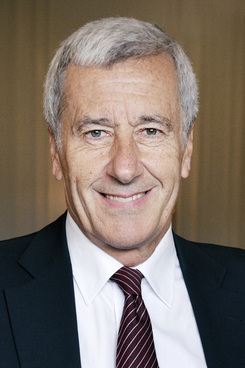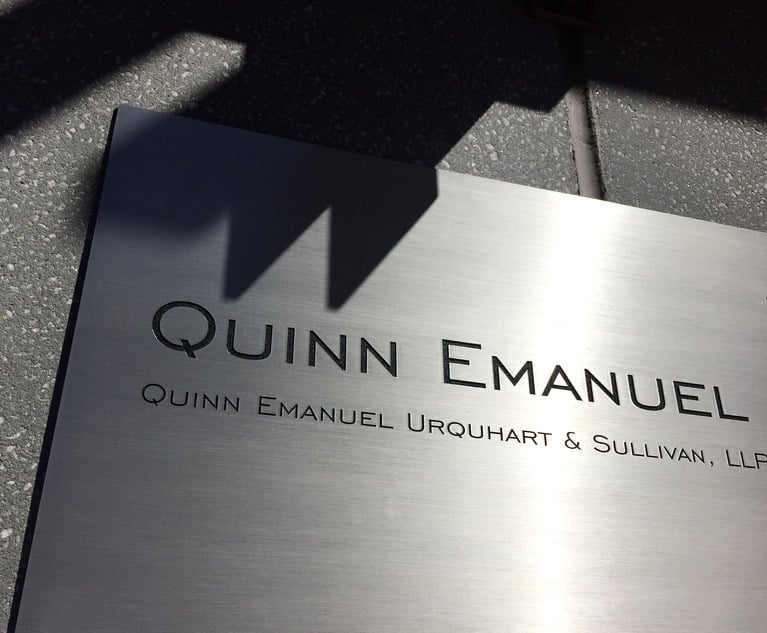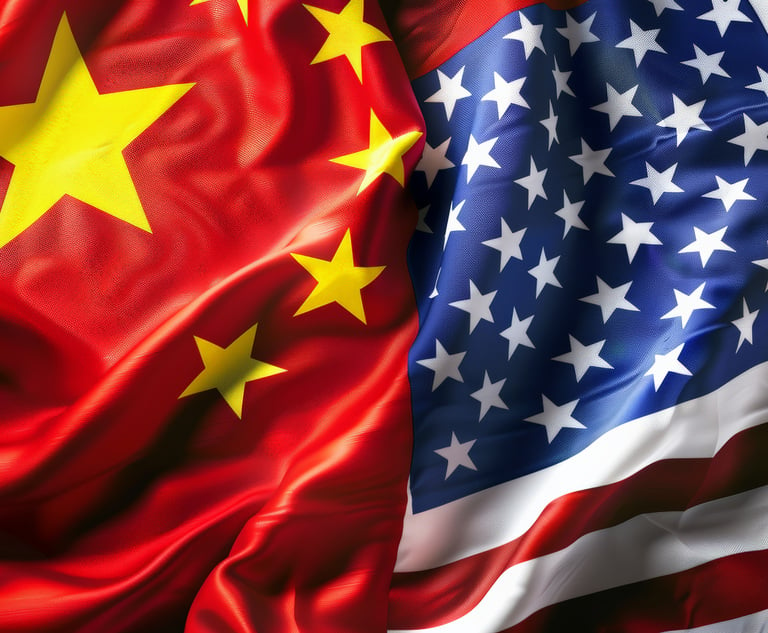The $50bn Yukos saga: partners discuss next round as January court date looms
Lead partners from White & Case and Shearman on the landmark dispute's next steps
November 30, 2016 at 05:11 AM
6 minute read
"I wouldn't want pensioners and students of Russia to pay this massive amount of money – because that's who will ultimately suffer from the payment if it is to be made," says White & Case London disputes partner David Goldberg.
Goldberg is referring to the $50bn (£47bn) arbitration award – the largest in history – that the Russian government was ordered to pay by the Hague's Permanent Court of Arbitration in 2014, following allegations made more than a decade ago that officials had manipulated the legal system to bankrupt the Yukos oil company and jail its boss Mikhail Khodorkovsky (pictured).
White & Case is acting for the Russian Federation, with Goldberg one of the lead partners on the case alongside litigation partners Carolyn Lamm and Francis Vasquez in Washington DC, and German arbitration head Markus Burianski in Frankfurt.
The firm helped to secure a major victory for Russia in April this year, when the Hague District Court overturned the $50bn award. Fellow US firm Cleary Gottlieb Steen & Hamilton has also played a key role on the case, serving as lead counsel for Russia until January – the firm has since been handling related arbitration work for the Federation.
And the work is far from over. The Yukos shareholders filed a notice of appeal in July, and last month secured a case management conference (CMC) hearing at the Dutch Court of Appeal, which is due to take place in mid-January next year. The full reasons for their appeal will be looked at during the CMC, with the appeal not expected to take place for at least another 12 months after that.
On the appeal, Russia will be represented by Dutch firms Houthoff Buruma and Hanotiau & van den Berg. The Yukos shareholders are being advised by Dutch law firm De Brauw Blackstone & Westbroek, with a team led by arbitration partner Marnix Leijten, alongside Shearman & Sterling, which has represented the shareholders on arbitration and enforcement proceedings since the case began in 2003.
 Shearman international arbitration head Emmanuel Gaillard (pictured right) is leading the firm's team alongside public international law head Yas Banifatemi.
Shearman international arbitration head Emmanuel Gaillard (pictured right) is leading the firm's team alongside public international law head Yas Banifatemi.
Gaillard comments: "While the first instance set-aside decision is a setback, the judgment is simply wrong, both as a matter of international and Russian law. We are confident that it will not stand on appeal."
The Dutch Court of Appeal has not yet decided whether the appeal will be split in phases, so that arguments related to the Energy Charter Treaty would be briefed separately from the others. This will also be discussed at the CMC.
"This approach has never been tested in Holland. Whether the court will decide to split the issues involved, we don't know; it would be unusual. We will fight for it not to be split," says Goldberg.
Gaillard adds: "This will obviously impact the procedural timetable, but we understand that the entire process – from the filing of the parties' written briefs, to an oral hearing, to the issuance of a decision – is likely to take a minimum of 12 months."
White & Case was first instructed by Russia in 2014 after it was ordered to pay the $50bn award. At the same time, Russia created the International Centre for Legal Protection, a dedicated agency to manage its counter-offensive and the attempts by Yukos's former shareholders to seize its assets around the world.
"When the Russian Federation came to us when they were in trouble – they were at the receiving end of a valid arbitration award equivalent to 20% of the Russian budget," says Goldberg. "We have overturned the situation dramatically, but at the time it wasn't looking good."
At the appeal, White & Case plans to present new evidence. "The appeal involves everything. It's like hearing the case afresh with some new evidence," he says.
Dmitry Gololobov, who worked as an in-house legal consultant for Bank Menatep and Yukos from 1995 until 2004, provided a statement in August outlining alleged illegal share transfers, bribery and destruction of evidence by the oil company's oligarch owners. "His statement includes stories about destruction of evidence relating to a truck full of documents," Goldberg explains. "The oligarchs used to own Bank Menatep, which defaulted and went insolvent owing money to international creditors, but the majority of documents for that bank were on a truck which fell into a river from a bridge – although the driver got out. There were 607 boxes of records."
At the same time, White & Case and Shearman are also still ploughing through enforcement actions in France and Belgium. "In the meantime, we also have to deal with all the enforcement actions. The question is: what is going to happen with these?" explains Goldberg.
After Russia was ordered to pay $50bn in 2014, former Yukos shareholders started enforcement proceedings against Russia's overseas assets in a number of countries including France, Belgium, Germany, the UK, the US and India. Germany and India have withdrawn, while the UK and the US have both agreed to a stay of proceedings.
Only France and Belgium proceedings are still in motion, says Goldberg. "The battleground is mainly in France and Belgium. In France they froze assets that they said belonged to the Russian Federation. Now there is a long battle as to whether they belong to the Russian Federation to begin with, and if they do, then whether they enjoy any diplomatic immunity and whether they should be frozen in any event, in light of the fact the award no longer exists."
When asked what the greatest challenge has been thus far, Goldberg and Gaillard unsurprisingly have very different answers.
Goldberg responds: "The biggest challenge is to fight this case during the current political climate. Whatever Putin does or did, whether he is right or wrong, whether a dictator or not, whether right or wrong in Syria or Ukraine – it doesn't matter for this case. But it's not that easy to fight the case with this political background. These Yukos oligarchs of course try to play a card that they are freedom fighters."
Meanwhile, Gaillard concludes: "Coming up head to head against the Russian Federation, a superpower with the entire state apparatus at its disposal, has not been easy, to say the least."
This content has been archived. It is available through our partners, LexisNexis® and Bloomberg Law.
To view this content, please continue to their sites.
Not a Lexis Subscriber?
Subscribe Now
Not a Bloomberg Law Subscriber?
Subscribe Now
NOT FOR REPRINT
© 2025 ALM Global, LLC, All Rights Reserved. Request academic re-use from www.copyright.com. All other uses, submit a request to [email protected]. For more information visit Asset & Logo Licensing.
You Might Like
View All
X Ordered to Release Data by German Court Amid Election Interference Concerns

Quinn Emanuel's Hamburg Managing Partner and Four-Lawyer Team Jump to Willkie Farr

Trump ICC Sanctions Condemned as ‘Brazen Attack’ on International Law

U.S.- China Trade War: Lawyers Label WTO Dispute Pointless, Clients Have Their Hands Tied
Trending Stories
- 1States Accuse Trump of Thwarting Court's Funding Restoration Order
- 2Microsoft Becomes Latest Tech Company to Face Claims of Stealing Marketing Commissions From Influencers
- 3Coral Gables Attorney Busted for Stalking Lawyer
- 4Trump's DOJ Delays Releasing Jan. 6 FBI Agents List Under Consent Order
- 5Securities Report Says That 2024 Settlements Passed a Total of $5.2B
Who Got The Work
J. Brugh Lower of Gibbons has entered an appearance for industrial equipment supplier Devco Corporation in a pending trademark infringement lawsuit. The suit, accusing the defendant of selling knock-off Graco products, was filed Dec. 18 in New Jersey District Court by Rivkin Radler on behalf of Graco Inc. and Graco Minnesota. The case, assigned to U.S. District Judge Zahid N. Quraishi, is 3:24-cv-11294, Graco Inc. et al v. Devco Corporation.
Who Got The Work
Rebecca Maller-Stein and Kent A. Yalowitz of Arnold & Porter Kaye Scholer have entered their appearances for Hanaco Venture Capital and its executives, Lior Prosor and David Frankel, in a pending securities lawsuit. The action, filed on Dec. 24 in New York Southern District Court by Zell, Aron & Co. on behalf of Goldeneye Advisors, accuses the defendants of negligently and fraudulently managing the plaintiff's $1 million investment. The case, assigned to U.S. District Judge Vernon S. Broderick, is 1:24-cv-09918, Goldeneye Advisors, LLC v. Hanaco Venture Capital, Ltd. et al.
Who Got The Work
Attorneys from A&O Shearman has stepped in as defense counsel for Toronto-Dominion Bank and other defendants in a pending securities class action. The suit, filed Dec. 11 in New York Southern District Court by Bleichmar Fonti & Auld, accuses the defendants of concealing the bank's 'pervasive' deficiencies in regards to its compliance with the Bank Secrecy Act and the quality of its anti-money laundering controls. The case, assigned to U.S. District Judge Arun Subramanian, is 1:24-cv-09445, Gonzalez v. The Toronto-Dominion Bank et al.
Who Got The Work
Crown Castle International, a Pennsylvania company providing shared communications infrastructure, has turned to Luke D. Wolf of Gordon Rees Scully Mansukhani to fend off a pending breach-of-contract lawsuit. The court action, filed Nov. 25 in Michigan Eastern District Court by Hooper Hathaway PC on behalf of The Town Residences LLC, accuses Crown Castle of failing to transfer approximately $30,000 in utility payments from T-Mobile in breach of a roof-top lease and assignment agreement. The case, assigned to U.S. District Judge Susan K. Declercq, is 2:24-cv-13131, The Town Residences LLC v. T-Mobile US, Inc. et al.
Who Got The Work
Wilfred P. Coronato and Daniel M. Schwartz of McCarter & English have stepped in as defense counsel to Electrolux Home Products Inc. in a pending product liability lawsuit. The court action, filed Nov. 26 in New York Eastern District Court by Poulos Lopiccolo PC and Nagel Rice LLP on behalf of David Stern, alleges that the defendant's refrigerators’ drawers and shelving repeatedly break and fall apart within months after purchase. The case, assigned to U.S. District Judge Joan M. Azrack, is 2:24-cv-08204, Stern v. Electrolux Home Products, Inc.
Featured Firms
Law Offices of Gary Martin Hays & Associates, P.C.
(470) 294-1674
Law Offices of Mark E. Salomone
(857) 444-6468
Smith & Hassler
(713) 739-1250









